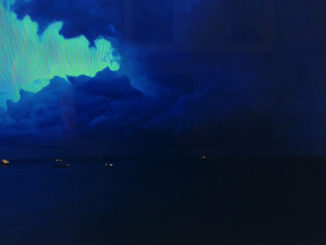
Lahore, Image by tayyab3425 from Pixabay
Over chai in the subcontinent, balut in the tropics or roast swan in an Oxbridge refectory the topic of conversation might turn to ‘given the chance, would you kill baby Hitler?’ In Latin this would be parsed as a question expecting the answer yes. But hold on a moment. Unencumbered by Adolph, his mad cousin from the hills, who even Hitler thought went a bit too far, might have raised an even bigger rabble all the way from his local bier Keller to Berlin and beyond. Likewise a far too clever nephew from the technocracy, honed by science university rather than a wasted youth at art school, might have filled the vacuum making a better job of conducting the German war effort, with catastrophic consequences for ourselves. And if it were a baby Stalin that you were invited to purge the world of, you might recall that the old monster was eventually on our side and without him, and the huge sacrifice by the Russian people he helped to inspire, we would never have won. We shall tread carefully before grabbing an opportunity to change history. Another important proviso would be knowing who it actually was.
I’m in a taxi in Karachi. The deal is that my driver will ferry me about for free as long as he can take me shopping with himself, presumably, getting a cut from the shopkeeper.
Decades ago Karachi was a sprawl of boiling hot concrete packed with traffic. It was impossible to keep a track of distances or direction as we wove our way through the mass. I had my windows wide open to try to allow for a cooling draft but it remained unbearably hot and also allowed, at low speeds, beggars to reach into the cab. My driver gave me a handful of small coins to fob them off with, instructing me to ignore anybody with stumps, as they were thieves (which is why their hands been chopped off). Likewise girls with burns were disobedient, (which is why their parents and doused them with cooking paraffin and set them on fire). Charming.
While we’re on the subject, one time I was horribly caught out by the local urchins. Pakistan in those days was one of those places where it was very difficult to spend the money. One could strike out, pile up with provisions and return to the compound with nearly as much cash as you’d set off with. The proviso being that the entropy of such things meant that a gentleman’s gold clip of high denomination notes had been turned into half a hundredweight of coin.
Now one day I was approached by local youth and told that, unlike the west, where a hundred of the lower denomination makes a higher denomination, (e.g. 100c = 1 dollar), in Pakistan it was a thousand. They were most apologetic and very sympathetic and offered to change a mountain of my coins into a few notes for my convenience. Well I was convinced. I counted out four thousand Annai in small coins ( trust me dear reader such a thing was possible) and was very relieved to receive in return four little one Rupee notes. However my suspicions were aroused when they turned and sprinted, despite carrying two stones of metal, and it being 150 degrees Fahrenheit in the shade.
Back in the taxi, as was the local style we suddenly stopped dead, and high double doors slipped open allowing us into a roadside compound within sight of the docks.
There were a few vehicles parked up, Land Cruisers and air conditioned, blacked out people carriers. Behind that, a row of steps reached up to a windowless concrete and steel clad building. On the steps lolled half a dozen guards with bare feet and Kalashnikovs, baggy trousers and open shirts. Now you can read a library of books on ethnicity and anthropogeny or you can just listen to the little voice in your head whispering, ‘oh my God, they’re Afghans’.
At the time the war in Afghanistan continued (as ever) under the tail end of a Soviet occupation. The Reds and their Afghan allies slogged it out against various factions allied against them including proxies of the Western powers, especially the Americans and the CIA.
People tended to spill over the border into Pakistan and then drift south into Sind province and onwards until they couldn’t drift any further therefore pilling up near the docks in Karachi.
With a hostile India to the east, a hostile China to the north and a hostile Iran to the south west, the last thing that the Pakistanis wanted was a hostile Afghanistan to the north west so the Afghans, fighters and otherwise, were tolerated.
As we wandered up the steps nodding and smiling at the guards I was, in effect, entering a Mujahideen cash and carry. In today’s money they might be called ‘Taliban’. It would be unfair to call them ‘Al Qaida’ as they had nothing to do with Osama Bin Laden. Hold on a minute.
Inside was an Aladdin’s cave of smuggled goods; animal pelts, onyx, leathers, cottons, and half a dozen very well covered (in the Afghan style) ladies stacking the shelves. The proprietor, a short, stout chap, was very pleased to see me, clasped both of my hands in his and shook and shook them. He could smell the dollar bills from where they were hidden under my clothing.
He was also thrilled to tell me that his regional rep was visiting from Kandahar. It was his wives who were stacking the shelves, and he himself was doing a bit of stock taking round the back. Now I didn’t quite catch the name but he might have referred to him to as something like ‘the sheik’. If I spent more than twenty dollars, I could chat to him over tea, an introduction beyond value. As ever, I was promised, the more you spend the less it costs.
I couldn’t be bothered to carry a lot of stuff, and didn’t dare trust their home delivery service, so kitted myself out in crocodile skin shoes, silk shirt, cotton strides and three leather jackets, to make it up to twenty dollars. Also a Panama style hat made out of something or other that presumably grows in the dessert next to the high way between Kandahar and Jaldak, probably in human dung. It certainly wasn’t Ecuadorian palm leaf straw.
The proprietor was ecstatic especially when I paid with one crisp, new twenty dollar bill. So, I was invited into a back room where in the gloom I could make out an exceptionally tall man sitting on his haunches between two bodyguards, on a mat, from a number of small bowls, with his fingers, eating rice presumably contaminated with twenty different types of cordite. He was no doubt taking a break from cashing up, stock taking and talking some poor soul though their sales targets.
He had long hair and a white beard, a long thin face (in the style if the Saudi aristocracy) and, although I’m no expert on body language, we all like a bit of people watching and I concluded he had a bit of kidney trouble by the way he was slightly slumped to one side and showing a slightly pained expression as he introduced himself, in a hushed voice, saying a name that I didn’t quite catch.
I was made to feel quite welcome. Despite the ferocious fighting reputation of the Afghan and that country’s reputation as being a graveyard for foreign armies, I’ve always found the Afghan to have a gentler side to his nature. Not only is it one of those awful places where men hold hands but they’re also taken by a tinge of blue in the eye, no matter what possesses it, male, female, human, cloven footed.
Translation wasn’t great but the regional manager wanted to give me a little pep talk. Now we’re all familiar with the idea that organisations hate their customers. That’s why they won’t answer the phone and keep on putting the prices up. For instance the BBC hates it’s viewers, the Daily Telegraph it’s readers, and in the fallen world of the modern day and its accursed internet, the most erudite, witty (and handsome) contributors to some (inferior) politics websites find themselves banned by the obese, gross and jealous proprietor. At least it doesn’t make us bitter.
We’re also familiar with the idea that people with a certain type of intense religious faith can be a bit ‘churchy’, even cantankerous and might even stoop towards a sprinkling of self righteousness. But the regional rep took all this to a new level. You’d think that he’d be gratefully for all those Russian servicemen, back over the border, with Roubles burning a hole in their pockets and nothing else to spend it on except the trinkets and accessories in a Mujahideen cash and carry. Far from it, he was pleased to say that he’d been killing them. In doing so, he would not only remove the Soviet presence from Afghanistan but crash the entire communist world altogether and Allah was helping him to do it.
Furthermore, he was establishing a ‘base’ (I imagined a row of big sheds full of fox furs on pallets, next to a motorway junction in Jalalabad), from which to do the same to America, Capitalism and the West. Allah was keen on that too.
Well, I nodded and agreed with him as you would when taking a leaflet off the Jehovah’s Witnesses or listening to the Priest telling you off for parking next to the fire exit, but didn’t take a huge amount of notice.
He went on to say that he wasn’t afraid of death as he would spend an eternity in paradise as a martyr and, also because if his martyrdom, Allah would provide in the here and now for his five wives and twenty six children, better than he ever could.
He reminded me that I was dirty, had never washed properly in my whole life and that I was spiritually contaminated by eating all the wrong food. He went as far as to say that it was the existence of the likes of me that made the world a less than perfect place and all that was keeping us away from a permanent and peaceful utopia was one giant blood bath. He ended, as any good manager should with,
‘Any questions?’
It did go very quiet for what seemed a long time and I felt I had to say something. The first thing that comes into ones head can be a help, and being a hill and lake man from a certain part of the country where the cultural expectation is that every thought should be spoken, I explained my difficulties with some local custom and then asked,
‘Sheik, how many Annai are there in a Rupee?’
He assured me that street urchins hadn’t to be trusted as they were motivated by desperation. He reminded me that my that my enemy’s enemy was my friend and that he could cut me very special deal. He promised me that there were ten thousand Annai to the Rupee and that, as a very special favour, despite the curse of capitalism, he could send a truck round to our compound, monthly, to convert our mountain of coin into notes.
And that dear reader was the last I thought of that gentleman until that pang of recognition watching the quickly censored images of the prime suspect on the British broadcast of American TV feeds on 9/11.
To be continued …..
© Always Worth Saying 2019
The Goodnight Vienna Audio file
Audio Player



